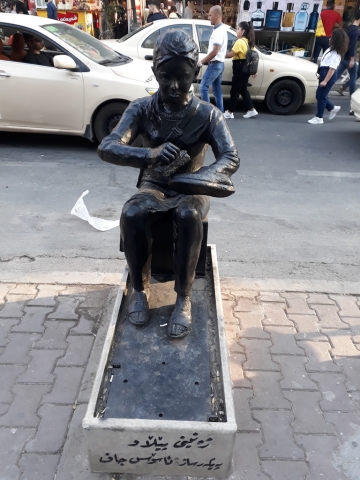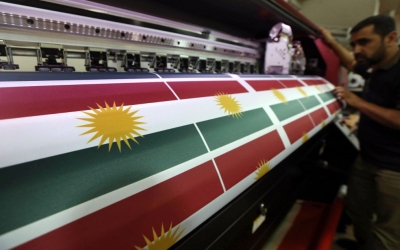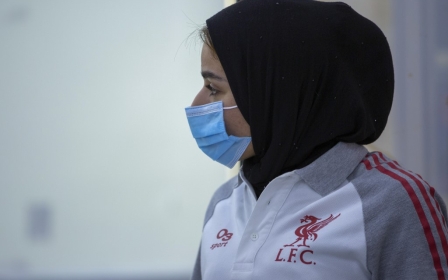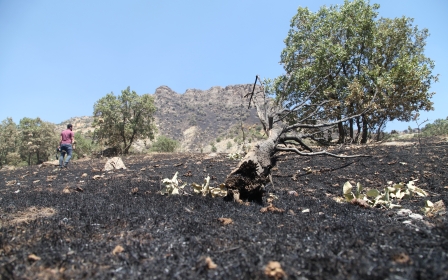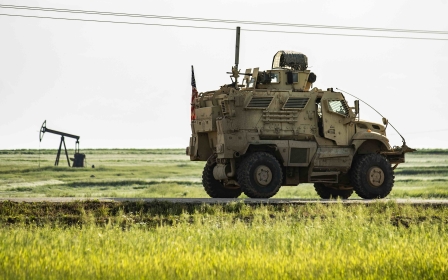Coronavirus: Iraq's 'Covid-19 generation' faces forced labour, lack of school
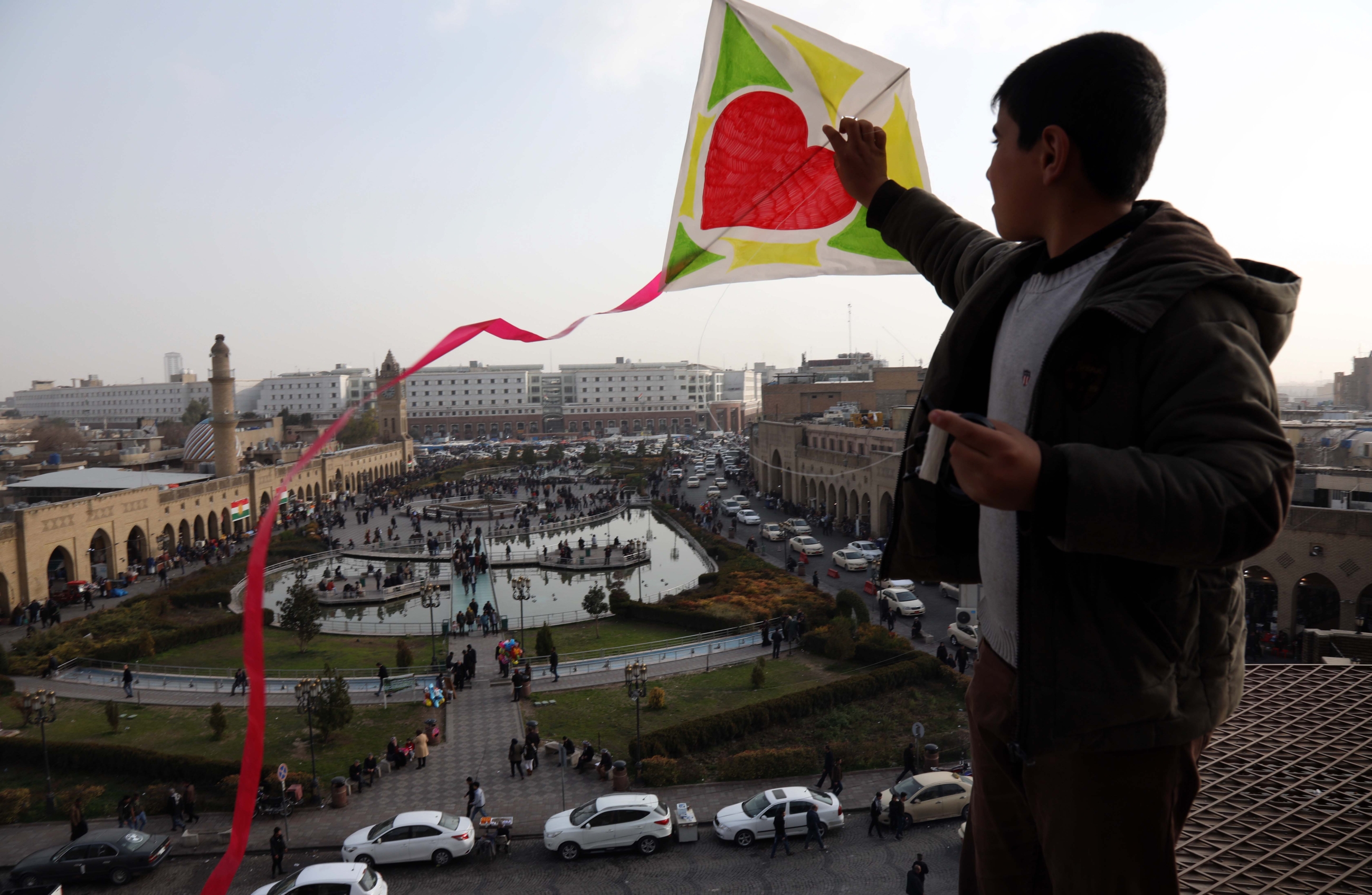
Yusuf, a 10-year-old Arab boy originally from Iraq's central Salahaddin province, sells plastic bags in the centre of Sulaymaniyah.
Yusuf is one of hundreds, if not thousands, of children working across northern Iraq's autonomous Kurdish region to help their families - or just to survive - at a time that Iraqi government coffers have shrunk due to the crash in oil prices, an economic crisis and a pandemic that has caused mayhem around the world.
"I never attended school [and] have been working here for more than two years," he told Middle East Eye. "My parents were killed by the Islamic State."
Many Kurdish families, internally displaced persons (IDPs) and Syrian refugees are forced to take their children out of school and send them to work in dangerous conditions in order to make ends meet.
'I never attended school [and] have been working here for more than two years. My parents were killed by the Islamic State'
- 10-year-old Yusuf
Iraq and the Kurdistan Regional Government (KRG) have suffered from a suffocating economic and financial crisis as a result of the global oil price decline, since both governments rely on oil sales for more than 90 percent of their revenue.
New MEE newsletter: Jerusalem Dispatch
Sign up to get the latest insights and analysis on Israel-Palestine, alongside Turkey Unpacked and other MEE newsletters
The KRG has also struggled to reach a lasting agreement with Baghdad on the region's share of the federal budget, exacerbating the situation in the Kurdish region.
A World Bank study released last month sounded the alarm over the scale at which Iraq's children were being affected by the crisis engulfing the country.
"Poverty increased by 11.7 percent to make the poverty rate 31.7 percent, compared to 20 percent in 2017-2018. Children under 18 faced a higher increase in poverty of 15.8 percent, bringing the poverty rate to 37.9 percent under the baseline scenario,” read the report, conducted by Unicef Iraq, the World Bank, Oxford Poverty, Human Development Initiative and the Ministry of Planning in Iraq.
Maltreatment by elders
MEE spoke with several children younger than 15 years old selling drinks and cigarettes in the marketplace in the centre of Sulaymaniyah, all without wearing masks despite the risks of catching or spreading the coronavirus.
Most of the children said they had left school or intended to quit in order to continue working.
"I want to collect money to purchase a new motorbike," said one 10-year-old boy selling bottled water.
Another 13-year-old Kurdish boy, who was selling locally made rosary beads, said that he did not want to be stuck at home, just doing nothing.
Sulaymaniyah police spokesman Sarkaw Ahmed told MEE that plainclothes police frequently inspected the marketplace.
"They are taking legal actions against anyone who hires children or forces them to work," he said.
"If the children are working due to poverty, or if the children are without parents, then the KRG Ministry of Labour and Social Affairs will allocate financial aid as well as shelter for them."
Few choices
Iraq is a signatory to the United Nations Convention on the Rights of the Child, which forbids children from "performing any work that is likely to be hazardous or to interfere with the child's education".
According to Iraqi and KRG law, children under 15 are forbidden from working.
However, NGOs have warned that poverty and high unemployment mean that many are simply left with no choice.
"Even before Covid-19 hit, 7.3 percent of children between the ages of five and 17 were engaged in various forms of child labour in Iraq, including dangerous and exploitative work," said Laila Ali, communication specialist at Unicef Iraq.
"As the pandemic continues to deprive families of work and therefore the ability to earn their livelihoods, there is a risk that vulnerable families will resort to harmful coping mechanisms - including child labour and child marriage - in order to make ends meet."
She urged the Iraqi authorities to bolster their support for children and families by ensuring equitable access to basic services and protection.
The KRG Ministry of Labour and Social Affairs held a workshop in Erbil on 19 August to deal with the issues of street children, in which a "draft work plan" was adopted.
Bashdar Abdul Khaliq, director-general of Erbil education services, said his agency was not able to conduct any research on out-of-school children, or to arrange awareness-raising campaigns to urge parents to send their children back to schools, due to the coronavirus pandemic. To contain the spread of the disease, all schools have been closed in the KRG since February.
"Although basic education until the ninth grade is [deemed] compulsory by the KRG Ministry of Education, the ministry rather plays a consultative role," Abdul Khaliq told MEE in a phone interview.
"Local security authorities should implement legal measures against those families who do not send their children to schools, but due to the bad economic situation in Kurdistan, security forces are not very serious in carrying out legal measures."
Nask Ismael, deputy supervisor at Kurdistan Save the Children (KSC), a Kurdish NGO established in 1991, told MEE that they had been working on child labour and street children since 2007 and this year had established a "child protection committee" in coordination with the police.
She said Covid-19 lockdown measures had not allowed them to conduct a survey on out-of-school and street children, adding they had been "searching the local markets" and had "taken legal actions against parents who are forcing their kids to work or beg".
"The coronavirus era has created many big issues that are affecting families and their children, including poverty, child labour, and high levels of unemployment, which now stands at 21 percent in Iraq," Latif Hussein, a Kurdish sociologist told MEE.
"Child labour will have longer-term implications on children's social, psychological, educational and health aspects, since working children directly interact with different types of adults."
Middle East Eye delivers independent and unrivalled coverage and analysis of the Middle East, North Africa and beyond. To learn more about republishing this content and the associated fees, please fill out this form. More about MEE can be found here.


